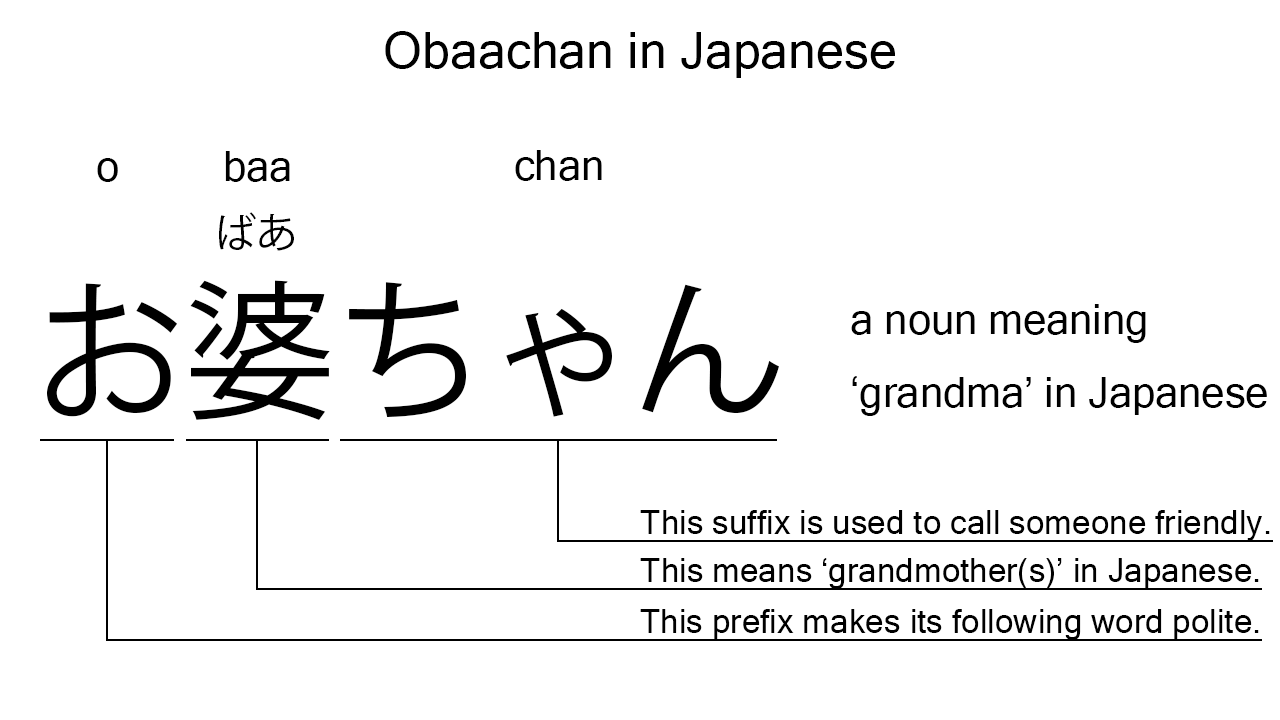What does “obaachan” mean in Japanese?
Native speakers use obaachan often to mean a ‘grandma’ in Japanese. Perhaps, some Japanese learners know this word as it is sometimes used in Japanese conversations. In this blog post, however, I’m explaining this word in detail based on its kanji-mixed expression. And also, I’m explaining how to use it through example sentences. My explanations would help Japanese learners understand obaachan more clearly. Then, let’s get started!
Contents
Definition and meaning of “obaachan”
Let me start with the definition and meaning of obaachan.
- obaachan – お婆ちゃん (おばあちゃん) : a noun used to mean a ‘grandma’ in Japanese. This can also work as plural. Learn more about Japanese plural.
Normally, this noun is used by a grandchild to call their grandmother in Japanese. This is widely considered less formal, so suitable for casual conversations. It’s also worth mentioning here that Japanese native speakers occasionally use this noun to refer to old women in general.
The definition and meaning are simple and clear. To understand this noun more clearly, however, let me explain its kanji-mixed expression in detail.
Obaachan in kanji
The kanji-mixed expression of obaachan consists of the following three components:
- o – お : a prefix making its following word polite.
- baa – 婆 (ばあ) : a noun which can mean a ‘grandmother’ in Japanese.
- chan – ちゃん : a suffix often used after someone’s name to call them friendly. This can be considered as the casual version of the most famous honorific suffix, san.
From these three components, we can understand that obaachan is literally the polite but still friendly expression for a grandmother in Japanese. And actually, it is. In Japan, grandchildren call their grandmothers with showing their respect and friendliness.

When we meet new kanji-mixed expressions, we should check their components in detail to understand their meanings clearly and deeply. In many cases, components tell us a lot about the meanings of the expressions they form. Actually, here, we could get the better understanding of obaachan through the detailed check above.
So far, I’ve explained the definition and meaning of obaachan together with its kanji-mixed expression. Then, let me explain how to use it through the example sentences below.
How to say “grandma” in Japanese
boku wa obaachan ga totemo suki desu – 僕はお婆ちゃんがとても好きです (ぼくはおばあちゃんがとてもすきです)
I love my grandma so much.
Below are the new words used in the example sentence.
- boku – 僕 (ぼく) : a pronoun meaning ‘I’ in Japanese. This is used mainly by boys and young males.
- wa – は : a binding particle working as a case marker or topic marker. In the example, this works after boku to make the subject in the sentence.
- ga – が : a case particle used to make the subject word or the object word in a sentence. In the example, this is used after obaachan to make the object in the sentence.
- totemo – とても : an adverb of degree meaning ‘very’, ‘much’, ‘so’, or such in Japanese. In the example, this works in front of suki to emphasize its meaning.
- suki – 好き (すき) : the stem part of the na-adjective, sukina, which means ‘favorite’ in Japanese. Native speakers, however, often use this as an individual word to mean ‘to like’ or ‘to love’ in Japanese. In the example, this is used to mean ‘to love’ in Japanese.
- desu – です : an auxiliary verb used after a noun or adjective to make it polite. Probably, this is well known as a part of the Japanese desu form. In the example, this is used after suki to make it sound polite.
This is a typical usage of obaachan. In this example, it works together with the case particle, ga, to become the object in the sentence.
Another example of “obaachan”
watashi wa tokidoki obaachan ni au – 私は時々お婆ちゃんに会う (わたしはときどきおばあちゃんにあう)
I sometimes meet my grandma.
Below are the new words used in the example sentence.
- watashi – 私 (わたし) : a pronoun meaning ‘I’ in Japanese.
- tokidoki – 時々 (ときどき) : an adverb of frequency meaning ‘sometimes’ in Japanese.
- ni – に : a case particle used to say in which direction an action goes. In the example, this is used after obaachan to say whom the speaker sometimes meets.
- au – 会う (あう) : a verb meaning ‘to meet’ in Japanese.
This is another example of obaachan. In this example, it works together with the case particle, ni, to become the object in the sentence.
Summary
In this blog post, I’ve explained the definition and meaning of obaachan in detail based on its kanji-mixed expression. And also, I’ve explained how to use it through the example sentences. Let me summarize them as follows.
- obaachan – お婆ちゃん (おばあちゃん) : a noun used to mean a ‘grandma’ in Japanese. This can also work as plural. Normally, this noun is used by a grandchild to call their grandmother in Japanese. This is widely considered less formal, so suitable for casual conversations. It’s also worth mentioning here that Japanese native speakers occasionally use this noun to refer to old women in general. Grammatically, this is the polite but still friendly expression for a grandmother in Japanese. And actually, it is. In Japan, grandchildren call their grandmothers with showing their respect and friendliness.
Hope my explanations are understandable and helpful for Japanese learners.
Leave a Reply